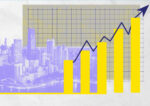Residential rent growth in downtown Chicago is starting to taper off after skyrocketing for months on end, but that doesn’t mean apartment demand is weakening.
So far this year, 2,400 apartment units have been added to downtown, with a total of 3,600 expected by the end of 2024, Crain’s reported, citing Integra Realty Resources. That’s a notable increase from the 2,900 units added last year and 1,500 in 2022.
Despite the new supply, average monthly rent for Class A downtown apartments rose to $3.68 per square foot in the first quarter, up 1.94 percent from the same period last year. That follows a modest 1.7 percent year-over-year increase in the fourth quarter of 2023, indicating a strong market, said Ron DeVries, Integra’s senior managing director.
“We’ve gotten a little bit of rent growth with a lot of supply hitting the market, which tells us that the market is really strong and that the developers are doing well,” DeVries told the outlet.
While recent rent growth has been subdued compared to the dramatic 32 percent year-over-year spike in 2021, the market remains robust. The first quarter saw net absorption of 1,390 units — the highest since the market’s rebound post-pandemic. Integra forecasts a total absorption of 2,790 units for 2024.
Several factors are driving downtown rental demand, including high interest rates deterring potential homebuyers and employment relocations to Chicago, particularly among recent college graduates.
Read more


However, remote-work trends have increased demand for housing outside of the central business district. Mike Zucker of Peak Properties noted that rents are rising more in Chicago neighborhoods outside of downtown due to the lack of new supply in these areas.
Notably, three buildings yielding over 1,000 units have opened in the West Loop this year, reflecting the area’s rapid growth. Downtown occupancy stood at 93.8 percent in the first quarter, a slight decline from 94.4 percent a year prior.
Despite the increased supply, landlords have not resorted to offering concessions, suggesting a still-strong market. Looking ahead, development is expected to slow next year due to financing challenges, potentially leading to rent increases of 5 percent to 8 percent, compared to the predicted 3 to 4 percent this year.
—Quinn Donoghue
